Share

Public Figure Society Podcast
#38-Turning the Entire World into our Tribe
The Moving Beyond Your Tribe podcast is now Public Figure Society Podcast
When we visit different countries, we experience and see how people behave, eat, and communicate, and we get a taste of their culture. It is different when we live in those places; then we know their culture on a deeper level. It would appear that as tourists, we only get to see the tip of the iceberg. Culture is visible not only in how people dress, eat, or talk; it impacts everything, the way people do business included. That is why cross-cultural deals that ignore the influence of culture in business are doomed to fail.
Joining me today is Brenda McGuire, CEO of WorldWide Connect, Virtual Trainer, and Speaker. She is a best-selling author, Cross-Cultural Expert, Founder of Global Gals, Global Leadership Coach, and Travel Expert. Brenda has been in 85 countries and lived in 6; she has over 25 years of international experience helping professionals succeed globally. At Global Gals, Brenda empowers and educates women to live, work, and travel the world.
In this episode, Brenda kindly shared how she went from being a country girl from Iowa, surrounded by a sea of cornfields, to be a globetrotter. We talked about the different kinds of business approaches from different cultures and the importance of understanding those differences. Brenda also shared her view on the way cross-cultural businesses will evolve in the following years.
Tune in and listen to Episode 38 of Moving Beyond Your Tribe and listen to Brenda's fascinating experiences around the world.
Some Questions I Ask:
- How did you go from local to global? (1:59)
- You've been to 85 countries, you've lived in 6 and connected yourself in various tribes. Would you tell us a bit of that? (10:33)
- In cross-cultural deals, would you say the most important currency is trust? (14:17)
- We are more and more creating a global mindset. And more and more companies are looking for a person with a global mindset. Could you give your perspective on what is a global mindset? (25:48)
- What would you think is going to happen to travel after the pandemic is over? (33:47)
In This Episode, You Will Learn:
- "See the World." The beginning of Brenda's journey (3:35)
- Life is about relationships. We connect with people in the most unexpected ways (8:07)
- Culture impacts everything. Business must learn everything from how to manage the workforce to close a deal (19:01)
- To perform cross-cultural deals, leaders must develop a global mindset (24:43)
- We are living the best times to do global business (32:31)
Resources:
- WorldWide Connect
- Global Gals
- Brenda McGuire website
- WorldWide Connect - Articles from CEO Magazine
- Global Gals - Article - 25 Life-Changing Ways to Live and Work Around the World
- How Being a World Traveler Helped Me Cope in a Covid World - Brenda McGuire
- Book: Nick Nanton, JW Dicks, Jeffrey Magee - Professional Performance 360: Special Edition: Success
- Free Downloads of Brenda's Book Chapter in Professional Performance 360
- Book: Jack Canfield, Janice L. Quigg, Nick Nanton - The Soul of Success
- Free Downloads of Brenda's Book Chapter in The Soul of Success
Connect with Brenda:
More episodes
View all episodes
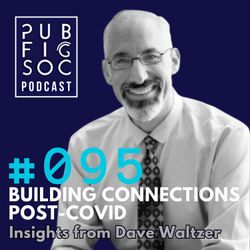
95. Forget Followers Build Real Relationships
44:00||Ep. 95We are flooded with content, followers, and digital noise, but real connection still cuts through. In this episode, I sit down with David Waltzer, founder of Wicked Awesome Happy Hour, to talk about why relationships are the only currency that holds its value. David shares how he went from transplant to community builder and created the most trusted networking space for entrepreneurs in Phoenix. We talk about showing up, leading with generosity, and why in the age of AI, relationships are the one thing you cannot automate.David Waltzer is the founder of Wicked Awesome Happy Hour, a community based networking movement in Phoenix. A United States Air Force veteran and financial services executive, David moved to Arizona in 2011 and quickly became a connector across business, nonprofit, and civic circles. Through Wicked Awesome, he has built a space rooted in generosity, trust, and real relationships, not transactions. His work continues to shape how entrepreneurs and leaders create community in a tech driven world.LinkedIn: https://www.linkedin.com/in/david-waltzer-98483b94/Website: https://wickedawesomeconnections.com/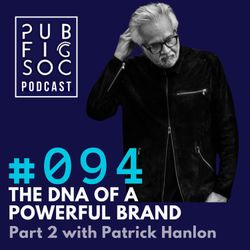
94. The DNA of a Powerful Brand
55:28||Ep. 94Patrick Hanlon is back and we dive into the DNA of brand. Even with the rise of AI and the changes happening in culture, the foundation remains the same. The DNA is branding. We explore the elements behind belief, community, and identity, and how they apply to both personal and business brands. We talk about what AI can and cannot do when it comes to storytelling, and why building real connection is still the core of any lasting brand. If you are navigating influence or trying to create momentum in a noisy world, this is your map.Key TakeawaysPrimal Branding is about building belief, not just visibilityThe seven elements of the Primal Code create long-term brand valueStorytelling is how humans connect and rememberPersonal branding starts with a strong, unique narrativeAI can support your brand strategy but cannot replace human creativityBuilding a community creates more momentum than building a personal brand aloneA clear creation story is essential to attract the right audiencePerformance marketing drives attention, but brand building drives loyaltyPeople want something to believe in, not just a productIt takes courage and consistency to lead a movementChapters00:00 Introduction to Primal Branding 07:43 Personal Branding as Identity 14:59 The Role of AI in Modern Branding 24:01 Storytelling as a Competitive Advantage 30:14 Navigating Performance Marketing and Brand Building 36:05 Why Preference Drives Growth 38:49 The Creation Story and Its Impact 42:24 Why Community Beats Personal Branding 46:06 The Second Follower and Building Belief 52:35 Patrick's Journey to the Primal Code 59:39 The Future of Branding in the Age of AIPatrick Hanlon is the founder and CEO of Primal Branding, a strategic brand consultancy built around the breakthrough framework introduced in his book Primal Branding—a modern classic that’s become required reading at YouTube and a go-to playbook for marketers worldwide.Hanlon’s core belief: brands are belief systems. In today’s world, where audiences are burned out on interruption and hype, Primal Branding offers a clear blueprint for building communities through story, meaning, and shared identity—not just pushing messages through a megaphone. His work bridges the gap between digital, social, and traditional marketing, providing the unifying theory behind content that connects and spreads.Over the years, Patrick and his team have launched new ventures and re-engineered iconic brands across the globe. His client list includes Levi's, PepsiCo, Shopify, Fossil, Experian, PayPal, Yum!, Kraft, Bungie, Time Warner Cable, GOOD/Upworthy, Brave Software, and The United Nations.A frequent keynote speaker and thought leader, Patrick has spoken at TEDx, IDEO, NYU, Parsons, the American Marketing Association, and more. His insights have been featured in Fast Company, Forbes, BusinessWeek Online, Inc., Entrepreneur, and NPR, and he has appeared on CNBC, Fox Business, and as a subject matter expert on branding in the documentary series The Kennedy Files.LinkedIn: https://www.linkedin.com/in/patrick-hanlon-primalbranding/Website: https://www.primalbranding.co/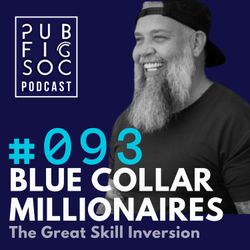
93. Blue-Collar Millionaires: The Great Skill Inversion
48:29||Ep. 93This week, I had the privilege of interviewing Neal Hanlon, my mentor, friend, and futurist, about the rapid evolution of AI and what it means for the future of work. Together, we dug into how AI has reshaped white-collar jobs since 2013 and why blue-collar skill sets will only become more valuable as automation continues to advance.Neal and I explored the mindset shifts that leaders and professionals will need to make to thrive in an AI-driven economy, from embracing creativity and strategic thinking to cultivating self-leadership and adaptability.We also discussed the critical role of policy and education in preparing for this transition, recognizing that policy must catch up with the pace of innovation.This is a bold, future-focused conversation that urges listeners to embrace continuous reinvention, leverage AI as a productivity partner, and recognize that hands-on expertise will shape the next generation of wealth and influence.Key Takeaways The Creativity Premium In a world where AI handles execution, the golden ticket belongs to those who can dream up what needs executing. Strategic thinking and creative problem solving become the ultimate differentiators.White Collar Extinction Event Entire industries built on processing information are about to discover they're competing against machines that never sleep, never err, and cost pennies per hour.Leverage or Perish AI isn't replacing humans. It's replacing humans who don't use AI. The winners will be those who turn these tools into productivity superpowers, not those who pretend they don't exist.Self Leadership Revolution Nobody's coming to save your career. The new economy rewards those who take radical ownership of their skill evolution and stop waiting for permission to reinvent themselves.The Blue Collar Gold Rush Physical skills are about to become digital gold. When robots can write code but can't fix your plumbing, guess who's laughing all the way to the bank?Chapters00:00 The Evolution of AI: A Journey from 2013 to Now 07:16 The Impact of AI on White-Collar Jobs 14:09 Reinventing Skills in the Age of AI 21:55 Becoming Indispensable: The Human Element in AI 30:40 The Business Case for AI: Time and Efficiency 37:33 Government’s Role in the AI Revolution 44:30 The Future of Work: Blue-Collar MillionairesNeal Conlon is a visionary strategist, entrepreneur, and technologist who has spent his career at the forefront of business innovation and leadership. With deep expertise spanning AI, emerging technologies, and systems thinking, Neal is known for his practical insight into how organizations and individuals can adapt to rapid change. A trusted advisor and mentor to founders, executives, and creators, he is passionate about empowering people to embrace new ideas, navigate disruption, and build lasting value in a shifting landscape.Whether delivering keynote talks, guiding companies through transformation, or sharing his knowledge on podcasts, Neal brings a unique blend of big-picture thinking and hands-on experience. His work centers on future-proofing careers and businesses by fostering self-leadership, innovation, and human-centered approaches in the age of automation.LinkedIn: https://www.linkedin.com/in/nealconlon/Website: www.nealconlon.com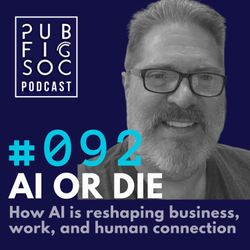
92. AI or Die: The Collapse of White-Collar Work and Rise of Digital Companions
45:51||Ep. 92In this episode, I sit down with Matthew Burkett, co-founder and director at Ceop Pro AI—an AI-powered executive operating platform that delivers strategic insights in just 48 hours, ten times faster and at a fraction of the cost of traditional consulting. With over 30 years of leadership and innovation experience, Matt is passionate about making AI-powered decision-making accessible to every business leader.We talk about how AI isn't just changing the way we work—it's rewriting the rules of society. We explore how AI is transforming business intelligence, becoming a powerful assistant, and even evolving into something more personal: a companion, a mentor, maybe even something spiritual. We unpack what this means for the collapse of white-collar roles, the future of education, and how to stay relevant in a world that's automating everything except meaning. This isn't a trend—it's a turning point.Key Takeaways:AI is cutting the time and cost of business reporting dramaticallyExecutives are using AI to automate high-level tasks and strategic decisionsAI can now match our communication style and learn our unique toneWe're seeing AI shift from being a tool to becoming a trusted partnerThere's a real conversation happening about trust and belief in AI systemsWhite-collar work as we know it is being automated out of existenceEducation is next unless it transforms to meet this momentPersonal productivity and growth are now accelerated exponentially by AIThose who master AI tools will dominate the next job marketThis moment belongs to people who move fast and stay sharpChapters: 00:00 Revolutionizing Business Intelligence with AI 12:05 AI as a Companion and Mentor 20:08 The Impact of AI on Employment and Society 29:53 The Future of AI and Human IntegrationMatthew Burkett is Director at CEOPRO.ai, where they're revolutionizing business intelligence with AI. Their platform delivers strategic insights in just 48 hours, 10x faster and at 1/10th the cost of traditional consulting. With over 30 years of experience in leadership and innovation, Matt is passionate about making AI powered decision making accessible to every business leader.Links: LinkedIn: https://www.linkedin.com/in/mattburkett/Website: https://www.ceopro.ai/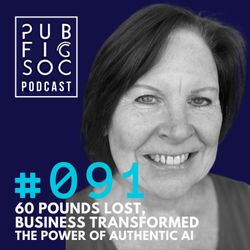
91. 60 Pounds Lost, Business Transformed: The Power of Authentic AI
36:56||Ep. 91In this captivating conversation, I sit down with Mary Kay Garrett after meeting her at a networking event at Podworks Studio. What began as my curiosity about her incredible 60-pound weight loss journey using ChatGPT quickly unfolded into a powerful story of total life transformation through authentic AI.Mary Kay reveals how the same AI tools that helped her shed 60 pounds became the foundation for revolutionizing her entire approach to business. She shares her unique methodology for creating "soul-infused" AI that authentically reflects your deepest values, vision, and purpose—turning personal transformation into professional breakthrough.Key Takeaways:How ChatGPT can be used as a powerful weight loss coach and accountability partnerThe connection between personal transformation and business successMary Kay's methodology for creating AI that reflects your authentic voice and valuesHow to use AI as a conscious partner without losing your humanityTurning breakthrough moments into scalable business opportunitiesThe difference between mimicking and authentically infusing AI with your essenceChapters00:00: Introduction and Meeting Mary Kay at Pod Works 02:50: The 60-Pound Weight Loss Journey with AI 08:03: Tools and Data: Tracking Health with AI 12:58: From Weight Loss to Healing Journey 16:34: AI as Emotional Counselor and Relationship Healer 19:19: Defining AI as Higher Consciousness Partner 21:40: Soul-Infused AI: Creating Authentic Digital Personas 25:13: The Future of AI in the Workplace 29:08: Family Response to AI Transformation 30:21: AI's Revolutionary Impact on Society 32:29: Balancing AI with Human Connection 33:46 – Embrace AI Partnership: Final AdviceGuest BioMary Kay Garrett is the founder of Soul-Infused AI, where she partners with entrepreneurs to create deeply auhentic AI that truly reflects their unique voice, vision, and purpose. Through personalized workshops, leadership coaching, and training programs, Mary Kay guides entrepreneurs to step into their authenticity and confidently infuse AI with their values and true selves. As a speaker, AI trainer, leadership coach, and authenticity mentor, she specializes in authentic AI training, conscious leadership, and helping entrepreneurs maintain their authentic essence while leveraging artificial intelligence for business growth.LinkedIn: https://www.linkedin.com/in/soulinfusedai/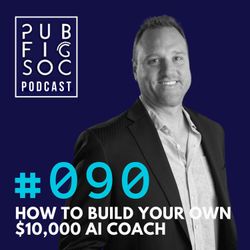
90. How to Build Your Own $10,000 AI Coach
37:07||Ep. 90In this episode, I sit down with DJ Barton, a seasoned entrepreneur who's revolutionized how he uses AI as a personal coach and mentor. DJ reveals how he's created AI alter egos that understand his unique needs and challenges, essentially building himself a $10,000 coach that's available 24/7.DJ shares his practical strategies for training AI to unlock its true potential, emphasizing the importance of detailed communication and his "high tech, high touch" philosophy that balances AI capabilities with human insight. He explains why embracing AI isn't just advantageous but essential for future success, offering listeners a clear roadmap for leveraging AI in both business growth and personal development.Key TakeawaysAI can serve as a personal coach and mentor available 24/7Training AI requires detailed and specific communication about your unique contextCreating an alter ego for AI enhances its effectiveness as a personalized advisorHigh tech should be balanced with high touch for optimal resultsAI can condense time and streamline processes when properly utilizedPersonal development is crucial in leveraging AI's full potentialEffective communication is key to maximizing AI's coaching capabilitiesAI can help overcome mental roadblocks and limiting beliefs by providing objective perspectiveEmbracing AI is essential for future success in business and personal growthBeing coachable and humble enhances the entire AI experienceEpisode TitlesUnlocking the Power of AI in BusinessTransforming Your Life with AI CoachingThe Future of Entrepreneurship with AIMemorable Sound Bites"High tech, but also high touch.""AI could be my $10,000 coach.""You have to be a sponge to eager to learn.""You can train it to be the best version of you.""It's hard to see the picture when you're in the frame.""AI is a 10,000-hour coach and mentor.""The universe aligned us last week."Chapter Breakdown00:00 Introduction to AI and Entrepreneurship02:59 The Power of AI as a Personal Coach05:52 Training Your AI: Creating an Alter Ego08:49 Maximizing AI for Business and Personal Growth11:49 The Importance of Detail in AI Interactions15:05 High Tech, High Touch: Balancing AI and Human Insight17:54 Personal Insights and Communication Skills20:49 The Societal Impact of AI and Alter Egos24:01 Future of AI: Embracing Change27:03 Practical Steps to Start Using AI29:50 Conclusion and Final ThoughtsGuest Bi: DJ Barton DJ Barton is a serial entrepreneur with over a decade of business experience and Co-Founder of Go Levarti, a travel company that helps families save up to 70% on vacations. Based in Scottsdale, Arizona, DJ specializes in helping entrepreneurs create scalable, location-independent businesses and is recognized for his innovative marketing strategies and dynamic leadership approach. He's a sought-after speaker and coach who focuses on business growth, personal development, and achieving financial and lifestyle freedom.LinkedIn: https://www.linkedin.com/in/therealdjbarton/Instagram: https://www.instagram.com/therealdjbarton/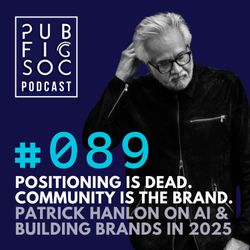
89. Positioning Is Dead. Community Is the Brand.
01:04:59||Ep. 89In this conversation, I sit down with Patrick Hanlon, author of Primal Branding—widely regarded as the most important book on branding ever written. Together, we explore why positioning is no longer enough, and how the brands that thrive in 2025 will be those that build community and belief—not just visibility.Patrick shares how the Primal Code—a set of elements like creation stories, rituals, and nonbelievers—is still the most powerful blueprint for building a brand people want to follow. We dive into how AI is changing branding, the tension between performance marketing and long-term brand equity, and what it means to create authentic human connection in a data-driven world.TakeawaysPrimal Branding builds belief systems, not just marketing plansPreference—not positioning—is what drives buying decisionsYour creation story sets emotional context and builds trustCommunity is the new personal brandAI can assist with brand audits and strategy, but can’t replace storyBranding without authenticity is forgettableThe second follower is what turns attention into momentumDifferentiation comes from meaning, not noisePerformance marketing is a sprint; branding is a marathonSuccess is about becoming a magnet, not a megaphoneChapters00:00 – Introduction to Patrick Hanlon and Primal Branding07:45 – The Essence of Personal Branding15:04 – How AI Is Reshaping Branding24:08 – Storytelling: The Original Influence Strategy30:23 – Performance Marketing vs. Long-Term Brand Building36:20 – Why Preference Beats Positioning39:05 – Creation Stories and Emotional Loyalty42:40 – From Personal Branding to Community-Led Growth46:24 – The Role of the Second Follower52:55 – The Origins and Framework of Primal Branding01:00:03 – Belief, Branding, and the Future with AIPatrick Hanlon is the founder and CEO of Primal Branding, a strategic brand consultancy built around the breakthrough framework introduced in his book Primal Branding—a modern classic that’s become required reading at YouTube and a go-to playbook for marketers worldwide.Hanlon’s core belief: brands are belief systems. In today’s world, where audiences are burned out on interruption and hype, Primal Branding offers a clear blueprint for building communities through story, meaning, and shared identity—not just pushing messages through a megaphone. His work bridges the gap between digital, social, and traditional marketing, providing the unifying theory behind content that connects and spreads.Over the years, Patrick and his team have launched new ventures and re-engineered iconic brands across the globe. His client list includes Levi's, PepsiCo, Shopify, Fossil, Experian, PayPal, Yum!, Kraft, Bungie, Time Warner Cable, GOOD/Upworthy, Brave Software, and The United Nations.A frequent keynote speaker and thought leader, Patrick has spoken at TEDx, IDEO, NYU, Parsons, the American Marketing Association, and more. His insights have been featured in Fast Company, Forbes, BusinessWeek Online, Inc., Entrepreneur, and NPR, and he has appeared on CNBC, Fox Business, and as a subject matter expert on branding in the documentary series The Kennedy Files.LinkedIn: https://www.linkedin.com/in/patrick-hanlon-primalbranding/Website: https://www.primalbranding.co/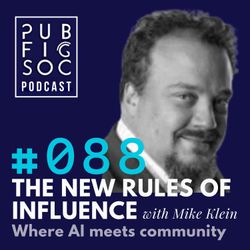
88. The New Rules of Influence
40:16||Season 4, Ep. 88I sat down with Mike Klein to talk about what it really takes to lead through communication in a world that’s anything but stable. This isn’t just about writing clean copy or managing internal newsletters—it’s about power, politics, and personal presence.Strategic communicators are being called to step up, not blend in. In this episode, we get into the real work of influence: shaping narratives, building credibility, navigating political landmines, and becoming the kind of leader people listen to.Key Takeaways:Communication isn’t a soft skill—it’s a leadership skill.Political climate shapes how and what we communicate—internally and externally.Personal branding isn’t optional anymore—your name is your leverage.Strategic communicators are power players, not support staff.Your network is your influence amplifier—introductions build authority.Legacy in comms isn’t about tenure—it’s about impact.Soundbite:“If you can’t communicate, you can’t lead.”“Credibility is the ultimate currency in communication.”“Strategic communicators are the translators of chaos.”“We are all brands now. The only question is: are you managing yours?”“Real influence is built behind the scenes, through connection and consistency.”Timestamps:00:00 – Intro: Why this conversation matters04:50 – The shift from messaging to strategy08:34 – Chaos, communication, and control12:34 – Navigating the political climate at work16:32 – What organizations get wrong about comms19:02 – Personal branding as a leadership tool22:04 – Strategic communication as career leverage25:56 – Building your presence and perception28:50 – The hidden value of introductions33:16 – Leadership, legacy, and the future of comms37:35 – Final thoughts: owning your influenceGuest Bio: Mike KleinMike Klein is a globally recognized expert in strategic and internal communication. With over 20 years of experience leading comms for global giants like Shell and Maersk, he’s the founder of #WeLeadComms and a vocal advocate for elevating the role of communicators in complex organizations. Based in Reykjavík, Mike is known for challenging the status quo and shaping the future of influence from the inside out.LinkedIn: https://www.linkedin.com/in/mklein818/Website: https://changingtheterms.com/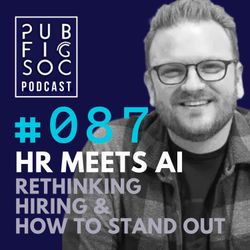
87. HR Meets AI: Rethinking Hiring and How to Stand Out
50:08||Season 4, Ep. 87My guest this week is Cailean Bailey, Head of Global Talent Acquisition at Design Pickle. We dive into what it really means to hire in the age of AI: and why it’s not about humans vs. machines, but about hiring humans who know how to use AI.Cailean brings a fresh and creative lens to recruiting, shaped by his years coaching Division I men’s soccer. At Design Pickle, he leads hiring across Technical, GTM, and Creative roles: and shares how their approach to “Pickle-izing” the hiring process helps protect culture, voice, and standards.We explore why curiosity and grit matter more than traditional credentials: how AI is changing the way we think about creativity and ghostwriting: and what the future of work looks like when the human element and technology work in sync. If you're building a team, applying for roles, or navigating where you fit in the AI-powered workforce, this episode is for you.Key Takeaways:Hire the human who uses AINever sacrifice your standards: just upgrade your toolsPickle-izing is about cultural alignment and consistencyCuriosity, grit, and adaptability are non-negotiablesAI doesn’t replace creatives: it powers them upSoundbites:"AI is part of your team""You won’t lose your job to AI: you’ll lose it to someone using it""Curiosity is a massive green flag""The true creative is you"Timestamps:00:00: Introduction to Talent Acquisition and AI02:55: Hiring Philosophy: Standards and Human Element06:12: From Coaching to Corporate Team Building08:44: Integrating AI into the Hiring Process12:04: Enhancing Candidate Experience with Automation14:57: What It Means to Pickle-ize Recruitment18:02: AI as a Power-Up in Creative Roles20:58: Addressing AI Stigma in Job Applications25:32: Ghostwriting to Voice Writing26:20: The Need for Upskilling and Adaptability29:14: Navigating Job Displacement and Human Potential30:15: AI as a Tool for Human Empowerment34:15: Creativity, Ethics, and Originality in the AI Era37:48: The Human Skills You Can’t Automate45:26: Final Thoughts on AI and Human CollaborationGuest Bio: Cailean BaileyCailean Bailey is a leader in global talent acquisition, with expertise in recruiting across technical, creative, and go-to-market teams. He currently leads Global Talent Acquisition at Design Pickle: a creative services platform powered by a built-in design workforce. Known for scaling startups and creating engaging hiring experiences, Cailean brings a creative spin to recruitment with a strong foundation in team building and onboarding.Before his corporate career, Cailean was a Division I men’s soccer coach: a background that deeply informs his leadership and hiring style today. He’s based in Scottsdale, Arizona, and is passionate about blending AI with the human touch to build smarter, stronger teams.Connect with Cailean:LinkedIn: https://www.linkedin.com/in/caileanbailey/Design Pickle: https://designpickle.com#PublicFigureSociety #HRMeetsAI #HiringWithHeart #AIFluency #WorkforceReady #DesignPickle #HumanEdge #RecruitmentReimagined #FutureOfHiring #VoiceNotGhost #CuriosityWins